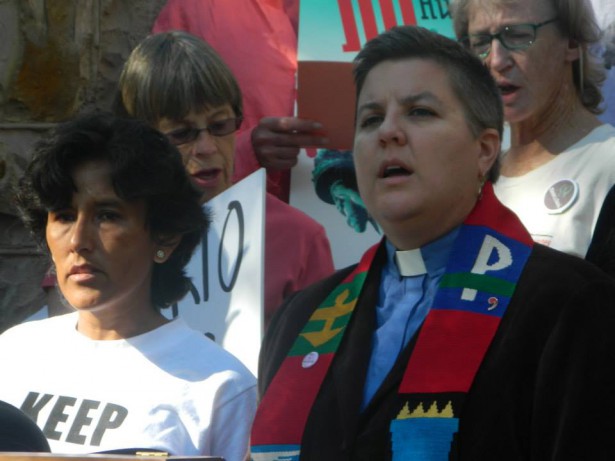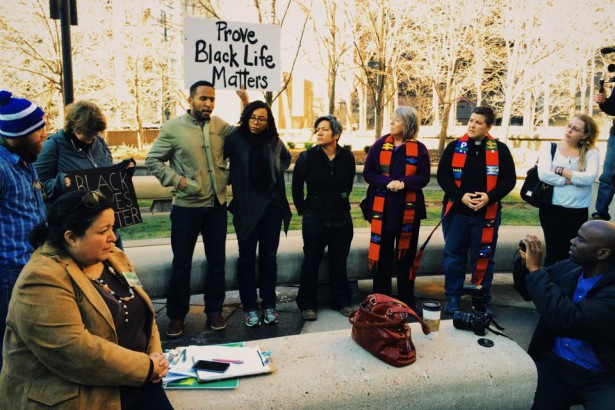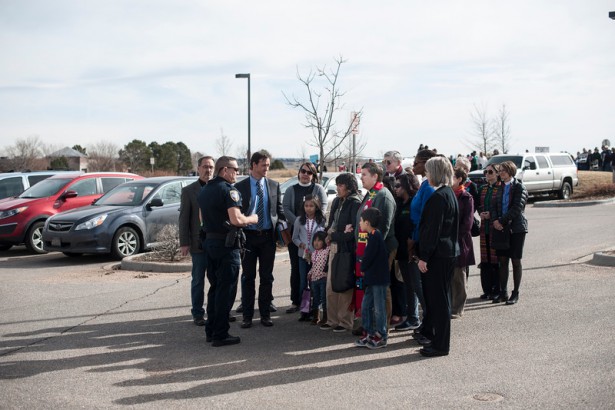
Editor’s note: In the wake of nationwide protests demanding justice for George Floyd, we are sharing some of our previous coverage about how to end systematic racism in America. For more, see this collection of stories from our archive.
From the massacre in Charleston to the police murder of Sandra Bland in Texas, racist violence is being met with outrage, and a growing black-led multiracial resistance movement that is on the move. With a sustained focus on institutional racist violence in the media due to the Black Lives Matter movement, white people across the country are both coming to consciousness about the enduring reality of white supremacy and looking for ways to take action for racial justice.
To help equip and inspire white people to step up and take action, I reached out to long-time faith-based white anti-racist leader and United Church of Christ minister Rev. Anne Dunlap, who serves as a “street pastor” for racial justice and solidarity in the Denver, Colorado area. For over 25 years she has been working in freedom movements with folks across race, gender and class lines, with a focus on solidarity with black, immigrant, worker and indigenous communities. As a faculty member of Iliff School of Theology, she helps train religious leaders to not only work for social justice themselves, but to move their congregations and larger faith communities into action.
In this interview, Rev. Dunlap reflects on her anti-racist work in white communities, her multiracial alliance-building efforts, liberation theology and the guidance she received from her departed mentor, black liberation theologian, historian and visionary, Vincent Harding.
How are you working to move white people into the racial justice movement in this time? What’s working? And what are you learning from what works?
I have been a faith-rooted justice movement activist and leader for a long time — nearly 30 years if you go back to my “call” into the work at age 16 that launched this trajectory of my life. I’ve done this work in many capacities, and most often as a “bridge” between white folk/communities and marginalized folk/communities. Whether it’s racial and economic justice, police brutality, detention abolition, deportation resistance or indigenous rights, I do pastoral solidarity work, as well as constantly try to get more white folk involved. In addition, in our local United Church of Christ conference we are working toward creating a position for racial justice and solidarity in which part of my work would include resourcing our predominantly white churches so that they can be bolder for racial justice. More informally are lots of conversations with white friends and colleagues about how we can show up — and how we show up — in the work for racial justice. Resource sharing is incredibly important here, whether by social media or sending a friend my favorite Andrea Smith resource.
One thing I have noticed is that as a white clergyperson who shows up often in pretty public ways, I am finding white people seek me out for conversation to talk through how they might do that too, or that they find themselves emboldened to take action where they are because they have seen me do it. I take that to mean that white folk are longing for some white models for racial justice and solidarity, and so we need those of us more practiced at it and/or are willing to “be public” to continue to do that, and encourage more folks to try it. And here I don’t mean posting your selfie at the latest action, but more importantly being public about our questions and wrestlings, being public about our mistakes, being public about the resources we find helpful, being public about our horror at what is continuing to be done in our name. If I might channel my mentor, Vincent Harding, let people see you be fully human in this messy, magnificent work that is the freedom movement.

To that I would add a couple of things: 1) recognizing that I am not an expert or the model and being clear that although I have been at this a long time I am also always just beginning; and 2) being public does not mean centering myself as a white person and thus de-centering the voices, experiences and lives of black, Latina/o, indigenous and immigrant folk. That can be a tricky dance, to both not hide and also not center my white self, and I am sure I don’t always get it right.
How do you think about effectiveness and how do you measure it? Can you share an experience that helps you think about effective work in white communities for racial justice?
As a spiritual leader rooted in radical Christian tradition and informed by liberationist, feminist/womanist, and post-colonial praxis, I have to ask: How do we understand “effectiveness” in ways that are non-capitalist? Capitalism is its own theological system which I find runs completely counter to what my tradition teaches. Capitalist “effectiveness” is driven by numbers, by production as if humans were cogs in a machine, by increasing profit and consumption and by continuous extraction of resources regardless of impact, by dividing up winners (most worthy) and losers. Capitalist “effectiveness” requires, as Andrea Smith writes, perpetual enslavement of black bodies, perpetual disappearance of indigenous bodies, perpetual war against the “foreign threat” of brown bodies. I’m not interested in those definitions of effectiveness.
What is “effectiveness” that is prophetic and revolutionary, that honors the wholeness of human dignity and the tender fragility of human lives and bodies, that honors not only human life but all creatures, flora, fauna, mineral, liquid, vapor? One experience that helps me think about this is a 2007 action I participated in, a nonviolent act of resistance against the Columbus Day parade in Denver that resulted in nearly a hundred of us being arrested and being pretty brutalized by the Denver police, both in the street and in the jail. I helped organize students, faculty, staff at the Iliff School of Theology where I was a student leader at the time. We had a group of 11 students and alums who were among those arrested — and nearly 40 more were present.
From the capitalist view one might argue this action was not “effective.” We were arrested, the parade continued, and almost all of us who went to trial were found guilty of violating the city’s “parade ordinance” (put in place to prevent protests of the Columbus Day parade), resisting arrest and other charges. The Denver police were never held accountable for their brutality against us. Some of us continue to live with the trauma to our bodies and psyches from that day. The whole event and its aftermath of trials and healing took immense resources and energy.
From what I might call the prophetic view, however, this is what I see: white students at Iliff emboldened to take action on this and other justice issues, including white parents who went to their children’s schools to get curriculum about Columbus changed; healers who stepped up and identified themselves and have continued to provide for the community’s healing; relationships of solidarity, trust and fierce love that were born that day and continue; and for many white folk, including myself, the breaking apart of the veil of “legitimacy” of the “justice system” and policing, and how both of those systems actually serve to perpetuate white supremacy. I am still seeing the impact of that action to this day in our community; the city thought they had won but the result was a stronger multiracial community of resistance in Denver, and with white folks pretty radicalized by our experience (whether as arrestees, witnesses or seeing the aftermath).
This is the kind of effectiveness our tradition teaches us is possible. It turns the wisdom of the world on its head. What the Roman Empire determined as “effective” — executing the radical Jesus by crucifixion — was rendered as foolishness when the Spirit-filled community rose up in resistance with their ringing proclamation that the Empire had no power over life or death: “Christ is risen!”
What are the goals and strategies (as emergent, planned, messy, and sophisticated, basic as it is) you’re operating from?
My big goal — and I believe this is the “big goal” the Divine attests to and longs for us in our tradition — is the total undoing of white supremacist capitalist heteropatriarchy for a world in which all life, not only human, but creatures and the land, as well, can flourish. To get there my part is to be in deep human relationship with marginalized communities, and to work with white folk and faith communities in particular.

We need as many nimble tools as possible for collective liberation. Besides the organizing work and just plain showing up for actions and such, some other tools for white folk who claim to be Christian include: 1) recovering and immersing ourselves in the liberative and revolutionary sources, biblical and theological, of Christian tradition, and sharing and embodying those. This includes perpetually reminding ourselves that the Bible is not the victory handbook of the Empire, but the outcry and deeply human wrestlings of the oppressed; 2) educating ourselves all the time especially through listening to oppressed voices. And letting those voices interrogate us deeply, letting them make us confront the ways white supremacy lives inside our heads. This is the un-sexy (because it is often invisible) work of disrupting whiteness as a white person and it’s just as important as showing up publicly, because it helps us know how to show up in better, more liberative ways; 3) learning the “people’s history” of struggle and liberation, including the local history of where we live, and sharing it; and 4) knowing our limits and doing our own healing work. This is so important and must not be overlooked. Therapy, herbal practice, Sabbath, physical labor at my friend’s goat farm, and spiritual direction all help keep me going and help me bring my best, most grounded self to the work, and I publicly encourage and affirm other folks’ efforts towards self-care.
A word about spiritual direction: I find this helps me cultivate discernment, holds space for my vocational wrestlings in the face of challenge, and fosters my ability to sit in the unknown and trust there is more going on here than I am aware of; this in particular allows me to let go of control which is one way whiteness perpetuates itself.
What challenges are you facing? How are you trying to overcome them? What are you learning from these experiences?
There are a couple of main ones for me. The first is institutions. Entrenched oppressions in institutions — including and especially the church and the academy — and the institutional capacity for self-preservation rather than liberation challenge me at the deepest level and cause me the most despair. Community — both close friends and a community of solidarity — is so much help in navigating this challenge. I have also learned that if there is no space for movement, no space for Spirit to crack open something, it might be best to walk away. I have done that on occasion — not walk away from the freedom movement, but from that particular institution that will take my life in ways I am not willing to give it. Everyone must do their own discernment around this; I may leave where another person may stay, and that’s cool.
The second challenge is being overwhelmed. Constantly confronting injustice and the death-dealing powers of empire is wearying enough, and I think our saturation with 24-hour news cycles and constant social media updates can sometimes make this worse (though social media is great for connecting and expressing solidarity). I have to be sure to take Sabbath time to rest, integrate, tend to my spirit and body and home. As a white person I have struggled with this because the temptation to be the “perfect ally” who shows up to everything is very strong (and capitalist-driven). I’ve learned to remind myself that I am not the center of the movement, and a healthy me, even if I’m not at everything, is so much better for the movement than a burned-out me.
How are you developing your own leadership and the leadership of people around you to step up in these profound, painful and powerful Black Lives Matter movement times?
As I mentioned, I have been in this work a long time, though focused more on immigration and economic justice. Last year two things happened that prompted some deep vocational discernment for me: Vincent Harding died, a loss I grieved deeply, and a few months later Michael Brown was killed. These are connected for me because Michael Brown was killed not long after Harding’s memorial service here in Denver, and I began to talk to Harding every day, asking him what I should do. It soon became clear that I was being called to deepen my justice work through the Black Lives Matter movement, and to do so by leaving my prior congregational position and embracing my role as “street pastor” — as well as responding to the outcry for white folks to educate white folks — by offering myself to our United Church of Christ conference as a resource.

In these intervening months I have utilized this “in-between” time of unknown in terms of a particular job by reading everything I can, taking advantage of trainings, finding resources for working on collective liberation with white folks and white church folks, trying on some new ways of reclaiming my voice as a leader, and most importantly building relationships and showing up in solidarity with our Black Lives Matter leaders in Denver. I feel like these last eight months in many ways have been a preparation for some amazing and difficult work that is about to unfold.

Thank you for saying this:
I take that to mean that white folk are longing for some white models for racial justice and solidarity, and so we need those of us more practiced at it and/or are willing to “be public” to continue to do that, and encourage more folks to try it. And here I don’t mean posting your selfie at the latest action, but more importantly being public about our questions and wrestlings, being public about our mistakes, being public about the resources we find helpful, being public about our horror at what is continuing to be done in our name. If I might channel my mentor, Vincent Harding, let people see you be fully human in this messy, magnificent work that is the freedom movement.
What wonderful advice! I was feeling this intuitively, but it is so helpful to hear it from another, and said so beautifully!